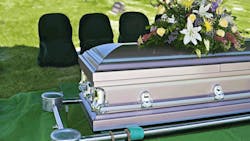Following the gruesome death of a worker at Behr Iron & Steel Inc.’s recycling facility in South Beloit, Ill., OSHA has cited the company for one serious and seven willful safety violations and proposed fines of $497,000 and placed the company in its Severe Violator Enforcement Program. The company operates under the name Behr Iron & Metal.
The victim, a 37-year old Hispanic immigrant, suffered multiple external and internal injuries after his arm was caught in a conveyor belt at the scrap metal shredding and sorting facility on March 10 and he was pulled into the machinery. At least three other workers also were exposed to dangerous, unguarded machines during cleaning operations.
“A wife and two little girls lost their husband, father and livelihood because Behr Iron & Steel knowingly exposed this worker to highly dangerous equipment with no safeguards,” said Dr. David Michaels, assistant secretary of labor, OSHA. “For this family, the American dream is now a nightmare. Behr Iron & Steel needs to be held accountable for its history of failing to protect their workforce.”
The worker was hired as a permanent employee in October 2013, after working under a temp-to-hire program though a local staffing agency. Of the employees working in the shredder and sorting process, five were temporary workers.
Behr Iron & Steel has contracts with both Premier Employee Solutions LLC’s location in Beloit, Wisc., and QPS Employment Group, headquartered in Brookfield, Wisc., to operate a temp-to-hire program that offers workers permanent positions after completion of a successful 90-day trial period. The workers are supervised and trained by Behr Iron & Steel.
Workers entered the shredder discharge pit through a 2 1/2 by 3 1/2 foot opening to perform their daily cleaning activities. Those activities involved shoveling metal scrap material that had accumulated in the pit onto a takeaway conveyor system. This conveyor was not guarded and the shredder was not locked out prior to the workers entering the pit.
“Management was aware that the shredder was not being locked out and that workers were accessing the pit with the conveyors running. Unfortunately, Behr Iron & Steel continued the practice of allowing the conveyor to run because it increased efficiency,” said Nick Walters, OSHA’s regional administrator in Chicago. “OSHA’s investigation found that safety training at the plant was woefully inefficient. The company failed to develop and implement required safety procedures at the facility, including permit-required confined space entry and hazardous energy control, despite being previously cited by OSHA for similar conditions at other locations.”
Several of the willful violations involved OSHA’s permit-required confined space regulations. A confined space is one large enough for workers to enter and perform certain jobs, has limited or restricted means for entry or exit and is not designed for continuous occupancy. OSHA found violations of those regulations, such as failing to implement training, procedures and practices for safe entry into the shredder pit and failing to inform employees of the dangers present in pit. The company also failed to prepare entry permits prior to allowing cleaning activities inside of the pit. Since the beginning of 2014, there have been three other fatalities in Illinois related to confined space violations.
The other willful violations cite the company for failing to utilize energy control procedures to prevent workers from coming in contact with operating parts of dangerous machinery by de-energizing and locking out the conveyor belt and providing workers specific instructions to follow before they can safely enter the shredder pit. Behr Iron & Steel also was cited for failing to conduct periodic inspections of equipment-specific lock out/tag out procedures since 2010.
A willful violation is one committed with intentional, knowing or voluntary disregard for the law’s requirement or plain indifference to employee safety and health.
One serious violation was issued for failing to evaluate the ability of emergency services to respond to emergencies occurring within a required permit-confined space. An OSHA violation is serious if death or serious physical harm could result from a hazard an employer knew or should have known exists.
About the Author

Sandy Smith
Sandy Smith is the former content director of EHS Today, and is currently the EHSQ content & community lead at Intelex Technologies Inc. She has written about occupational safety and health and environmental issues since 1990.
